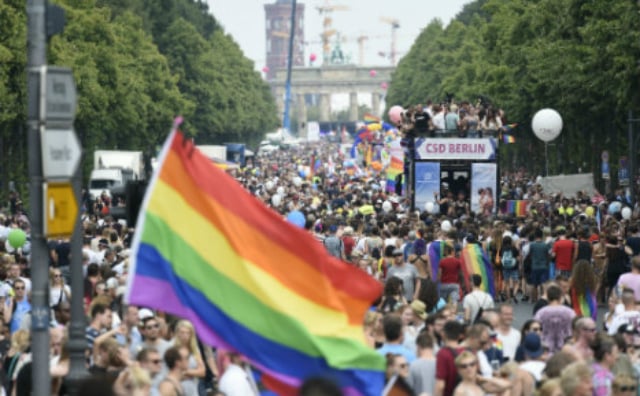“It was raining, of course,” Groffman remembers of his first Berlin gay pride march.
“It was huge and overwhelming. Everyone was drinking on the street – drinking everywhere. I didn't know anyone and suddenly I found myself in all these situations, moving from party to party.”
Groffman had just spent two years travelling the globe after chucking in his job as a graphic designer in Boston.
Berlin was supposed to be one of the last stops before he spent his last savings on a cheap flight home. But when he tried to leave – first travelling to Prague, then Vienna – he found Berlin dragging him back.
“It was very gay, very open, very exciting – I’ve been here ever since.”
Now he makes his money writing gay travel guides to cities including Amsterdam, Budapest and Tel Aviv.
“As a gay traveller now, I don’t have to stay in a gay hotel. Gay travellers want to find the best places, not necessarily the gay places,” he says, explaining how a lack of good LGBT travel literature motivated him to start his own guides.
As an example he mentions the Berlin district of Schöneberg, which has been the city’s “gay neighbourhood” since the 1920s.
“I never go out in Schöneberg, it’s just not very cool. There are far better bars in [the south Berlin neighbourhood] Neukölln. And there are gay bars in Neukölln as well.
“But a lot of the travel guides for Berlin still talk about Schöneberg as being the gay area. It is still very gay obviously, but there has been a lot of shift further to the east of the city.”
Groffman and travel guide publisher Berta Luise Heide have brought out a QueerBerlin map in anticipation of Christopher Street Day 2017, which is taking place on July 22nd. The map suggests gay-friendly museums, shops and bars, as well as marking out three walking tours around the city.
 Adam Groffman. Photo: Private
Adam Groffman. Photo: Private
“A lot of people go to the Holocaust Memorial [in central Berlin]. But people sometimes forget, or don’t realize, that just across the street is the memorial to LGBT victims of the Nazis,” he says, pointing out one route on the map, which also takes in regular sightseeing such as the Reichstag building and the Tiergarten park.
He emphasizes that Schöneberg is worth a visit to get an appreciation for the city's gay past. It is home to the Schwules Museum (Gay Museum), while Motzstrasse and Nollendorfplatz are still home to numerous gay bars and shops.
Pride is actually two weeks of celebrations in Berlin, starting this weekend. And Groffman points out that the Stadtfest in Nollendorfplatz, held July 15th-16th, introduces people to various local queer societies, such as film clubs.
“It is really useful if you've just moved here,” he says.
“But to experience today's gay culture in Berlin, you need to go to the bars and clubs of Neukölln and Kreuzberg, places like Südblock, Roses or Silver Future.”
Groffman also recommends that people in Berlin for Christopher Street Day check out SchwuZ, one of the largest gay clubs in Berlin, which is throwing an after party.
“I prefer it to the official after party, where the gay scene goes – it’s more queer, more inclusive.”
He also mentions the Yo! Sissi music festival, which happens on the weekend after Pride, as being “more underground than Christopher Street Day. It gets to the roots of the gay cultural scene here.”
And for those who want something a little bit more reflective, Groffman says you should head to the Kino International, which puts on an LGBT film once a week.
“Especially for solo travellers, Berlin is great around Christopher Street Day, because it fosters connections between people.”



 Please whitelist us to continue reading.
Please whitelist us to continue reading.